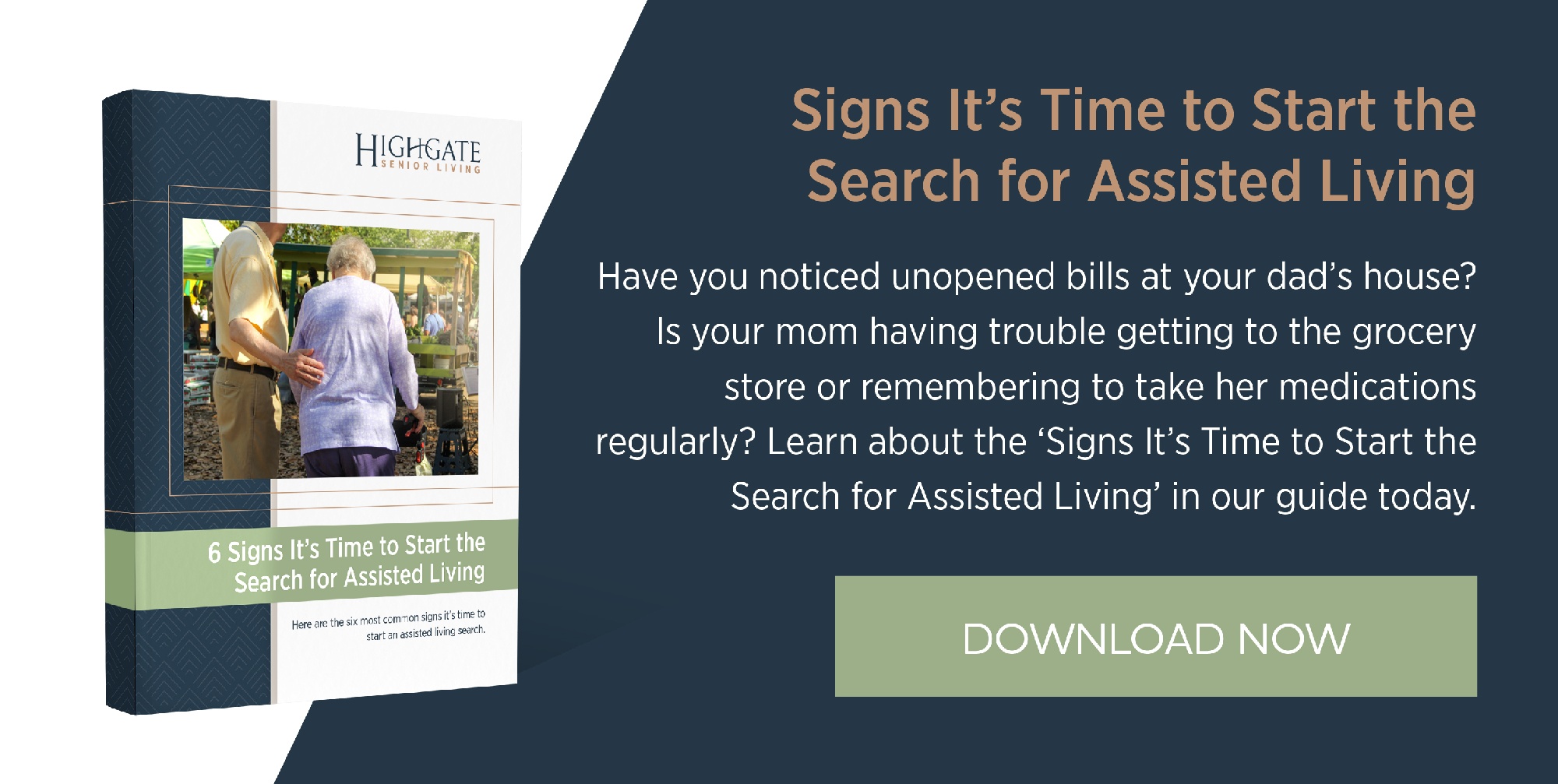
Wouldn’t it be nice if there was a hard and fast rule about when you should start exploring assisted living options? Each situation is different, and there isn’t a certain age people typically begin looking.
But what most people do is the opposite of what you should do, waiting until a crisis strikes and the need is immediate to do any research. This can leave you stuck on a long waitlist or in an assisted living community that wasn’t your first choice.
It’s normal that your parents want to stay in their home as long as possible, and maybe they don't need to move now. But if assisted living is in their future, start your search early. Assisted living is geared towards those that don’t necessarily need 24-hour nursing care, but may need some assistance maintaining living quarters, or assisted with activities of daily living like bathing, dressing, or managing medications.
If you do your homework early, it’ll be easier to move if things start to change quickly.
Talking to Your Parents
When it comes to caring for aging parents, you need to find out what they want, what their plans are, and what role they need you to play. As you start the discussion about long-term care, it may be helpful to create a checklist to guide the conversation.
Here are questions that can help you navigate this complex and often challenging conversation, broken down into manageable topics. Don’t overwhelm them with statistics and forms. Instead, allow plenty of time to focus on individual topics, one by one, to help plan for next steps.
- Lifestyle: What does daily life look like now? What do you expect it to look like in the future? Are there situations you’ve seen, experienced, or heard about from your friends that you would like to avoid, especially at a time when you’re most vulnerable?
- Legal: Is there a will/living will, durable power of attorney, or health care power of attorney in place? Are those documents up to date and accessible?
- Finances: How are bills currently being paid? Is there income that can be redirected for care if need be?
- Medical Care: Are health histories and contact information for all current medical providers available and up to date?
- Care Options: Do you know the different options available for receiving care? Where would you like to receive care?
The sooner you start tackling these questions together, the sooner you’ll gain a better understanding of what is possible for the future and how to prepare for it.
Watching for Warning Signs
Are your parents the type who will make the decision to transition to assisted living on their own? Or do you think they’ll need a gentle push from their friends and family members?
It’s not easy to suggest a move from the home that they’ve lived in over the years into an assisted living community. But there are warning signs to look for that indicate it’s probably time to transition to this type of care.
Here are some of the most common signs that it may be time for assisted living.
- Difficulty managing activities of daily living, such as dressing, shopping, cooking, bathing (or other personal hygiene activities), doing laundry and managing medications
- Days spent without leaving the house
- Unopened bills and letters from banks piling up
- Drastic changes in appearance
- Neglect around the home
Making the Choice
Although some seniors may be hesitant to move to an assisted living facility, there are others that are making the decision to move at a younger age. Why?
More active older adults are making the move to senior living communities as a lifestyle choice because assisted living communities offer amenities, services, and a social environment you can’t find living alone. Assisted living facilities can provide opportunities to enjoy group discussions on current events, exercise classes, shopping and special outings, games, live entertainment, movies, sports, sing-alongs, and more all while still having the ability to maintain independence.
By moving before a crisis occurs, they can take advantage of these services, amenities, and opportunities now, and they can rest easy knowing they have access to health services before they need them. The bottom line is, many seniors are moving at a younger age because assisted living can be fun, and can help seniors live a life of purpose.
With the array of assisted living facilities available throughout the U.S., the sheer amount of choices can seem overwhelming. You can do much of the legwork for your parents, but have discussions with them about their desires and preferences and, ideally, present them with a range of options. Together, decide what you need, find locations that match your needs, and evaluate locations using multiple resources.
Throughout the journey for your parents’ new home, keep the focus on finding a residence that will keep them happy and healthy in the present and for the years to come.






